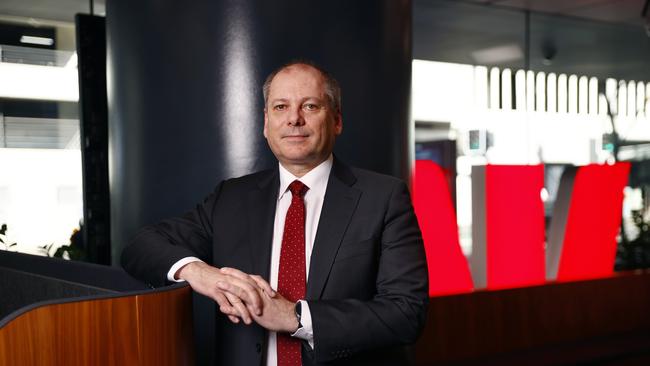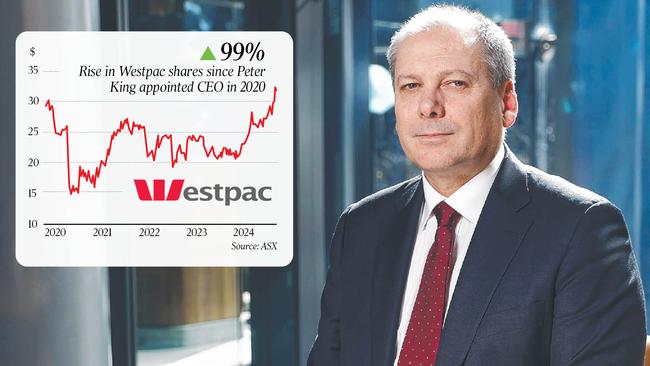How Westpac CEO Peter King steadied the ship through several storms
Peter King has played a key role in restoring confidence in Westpac after it was hit by the Austrac scandal and then Covid.

Westpac veteran Peter King was the accidental chief executive of Australia’s oldest bank, who has played a key role in steadying the ship and restoring confidence after it was hit by the Austrac scandal and then Covid.
While incoming chief executive Anthony Miller is vowing to “unleash Westpac’s true potential”, King sees himself as the leader with an experience honed under fire in dealing with crisis after crisis, from the dire state of the bank in the early 1990s to the GFC, who was able to step in and steer Westpac through some of its lowest moments.
“My five years (as chief executive) has really been about lifting risk management, getting confidence back in the bank, and simplifying the business portfolio,” he said in an interview with The Australian on Monday. “It has been a focus which was very internal for the majority of that period.
“For the last year we’ve really been moving the culture to focus on customer service and competing in the market. I see it as a build.”
Joining the bank in 1994 when it was under threat from its exposure from the slump in the property market in the wake of the “recession Australia had to have”, King had already done a lot of the hard yards at the bank as chief financial officer and was planning his retirement in 2019 when the severity of the Austrac action against the bank hit home.
The move sent the bank reeling, with chief executive Brian Hartzer resigning and chair Lindsay Maxsted announcing plans to retire earlier than expected. As King said later, he went through a “bath of fire” stepping into the role of acting chief executive at short notice in November, making the transition in only a weekend.
“I had a weekend to move from the mindset of the CFO to the mindset of the CEO,” he told The Australian. “Then we had the big bushfires over Christmas and then, by March, we were dealing with Covid.”
The onset of Covid further undermined confidence in the bank, sending its share price from about $26 at the beginning of the year down to below $16 by March.
Chair John McFarlane, who started in January 2020 taking over from Maxsted, knew he had to act fast. He asked King to stay on as the permanent CEO, saying that the bank “needed a chief executive in place now, not later, and with full, rather than acting, authority”.
King agreed, pointing to his handling of crises in the bank with the commercial property bust of the early ’90s and the GFC. “The bank has been very loyal to me,” he said, accepting the job, but only on the condition that it was to be a two-year stint.
“We’re at a point where I feel I can add a lot helping the team navigate what is a crisis impacting customers and credit losses.”
But as the bank continued to battle the combined forces of Covid and the action by Austrac, which saw Westpac hit with a record $1.3bn fine by the Federal Court in October 2020, King realised the task ahead of him was much more challenging and decided he needed to stay on longer.

One of his early decisions was to hire Anthony Miller, Deutsche Bank’s Australian chief, to head up the bank’s institutional arm.
He continued to slim down the bank’s operations, completing the sale of its life insurance business to TAL in August 2022, and reducing the bank’s geographical footprint with a primary focus on its core Australia and New Zealand assets.
It has been a tough, relentless job. “I was chief financial officer for five years then chief executive or acting chief executive for five years,” King recalls. “They are seven day a week jobs which are important for the economy as we have 20 per cent share of the banking market,” he said. “I have probably prepared 36 financial results and presented 20.”
King’s work has included resetting the culture and risk management in the bank, and pushing to recover Westpac’s market share lost during the crisis of confidence from the Austrac scandal, starting with its household deposits. “Our household deposit position has been slowly increasing in market share,” he said on Monday.
King recalls the Austrac scandal cost the bank far more than the fines – costing it the confidence of key customers along the way.
Asked what achievements he felt most proud of during his time as chief executive, King cites restoring confidence in the bank, “simplifying the bank’s business portfolio, dealing with risk management issues and getting us more externally focused.”
One of the key tasks ahead of the incoming Miller will be to oversee the completion of Project Unite, a $1.8bn to $2bn upgrade to consolidate its tech platforms, including halving the number of banker platforms to three, consolidating 11 customer onboarding systems and streamlining seven different systems into two.
Chair Steve Gregg summed up King’s achievements as he announced his successor on Monday. “He stepped in at a very difficult time in 2019, steering the company through several regulatory challenges and the Covid pandemic.”
King, he said, “has provided much-needed stability to the bank while transforming risk management. He simplified the company’s portfolio of businesses and returned it to growth in key divisions. He’s now begun the critical task of technology simplification, which will continue under Anthony (Miller).”
Westpac shares have risen to almost $32 this week under his leadership. King leaves the bank in much better shape than when he took over, but Westpac shareholders will be looking to Miller to resume its growth momentum, oversee the successful completion of Project Unite and regain its former market share.






To join the conversation, please log in. Don't have an account? Register
Join the conversation, you are commenting as Logout